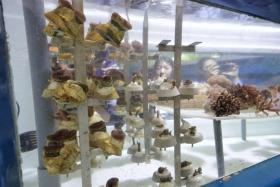More mosquito traps to be deployed as dengue cases rise
Surge in dengue cases, with 10,748 cases as of Aug 24, up from 9,135 on Aug 2
The National Environment Agency (NEA) will progressively deploy another 14,000 Gravitraps - small black cylinders that trap female Aedes aegypti mosquitoes looking for water surfaces to lay eggs on - to newly built Housing Board blocks and landed estates over the next four months.
They will augment the NEA's current network of 50,000 traps and enhance its surveillance capabilities, said Minister for the Environment and Water Resources Masagos Zulkifli in Parliament yesterday.
This will allow the NEA to prioritise its resources and deploy officers to focus on areas with a high mosquito population.
Mr Masagos was responding to questions from four MPs on the dengue situation.
There has been a surge in the number of dengue cases here, with 10,748 cases reported as of Aug 24, up from 9,135 on Aug 2.
Mr Masagos said the rise can be attributed to three key factors: an increase in mosquito population; the warmer weather; and a lower herd immunity in Singapore's population.
The Aedes aegypti mosquito population has increased by almost three times since the last major dengue outbreak in 2013, and this increases the risk of transmission.
In addition, the mean temperature for the first half of this year was 0.7 deg C higher than in the same period last year. Warmer temperatures result in a higher transmission of dengue due to an accelerated growth of the Aedes mosquito population and a shorter incubation period of the dengue virus.
Finally, due to Singapore's past successes in dengue prevention, the proportion of adults who have had dengue before has decreased from 59 per cent in 2004 to 51 per cent in 2009 and 41 per cent in 2017.
This has resulted in a lower herd immunity among the population, and so a large proportion of Singapore's resident population is susceptible to dengue.
Mr Masagos highlighted a number of measures the NEA has taken. He said since Aug 25, the NEA has partnered the People's Association (PA) to step up dengue outreach efforts.
The NEA has also started sharing on its webpage information on areas with higher Aedes adult mosquito population.
Mr Masagos shared that the anti-dengue efforts so far have been paying off.
As of Aug 24, 863 of the 1,021 dengue clusters formed this year had been closed.
These include some of the largest clusters in Woodlands, Upper Thomson, Chai Chee and Pasir Ris.
The weekly number of dengue cases also fell - from a high of 664 cases in the second week of July to 480 cases in the third week of last month.
Get The New Paper on your phone with the free TNP app. Download from the Apple App Store or Google Play Store now


